Sir John Monash, Personal Files Book 11, 31 January - 29 February 1916, Part 12
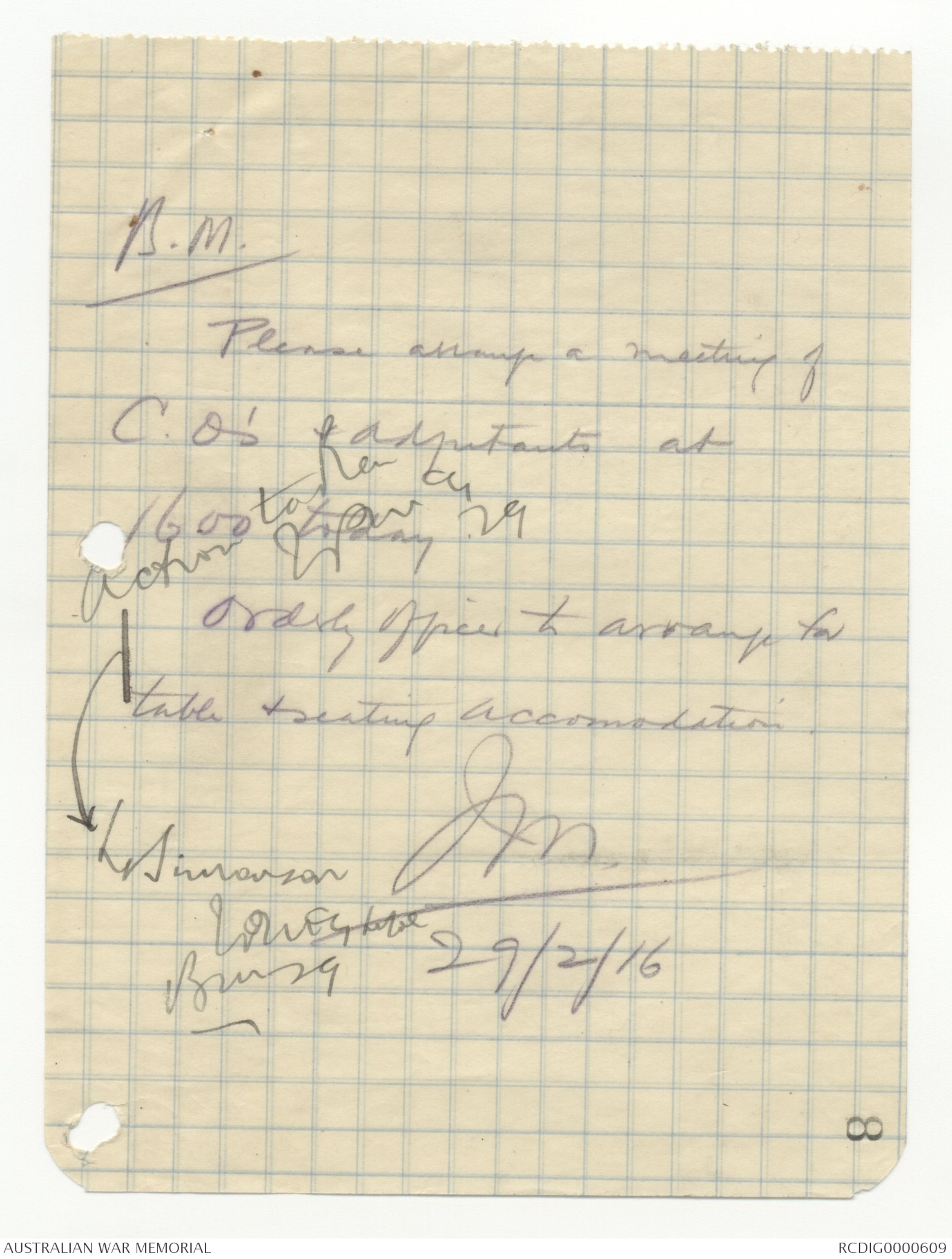
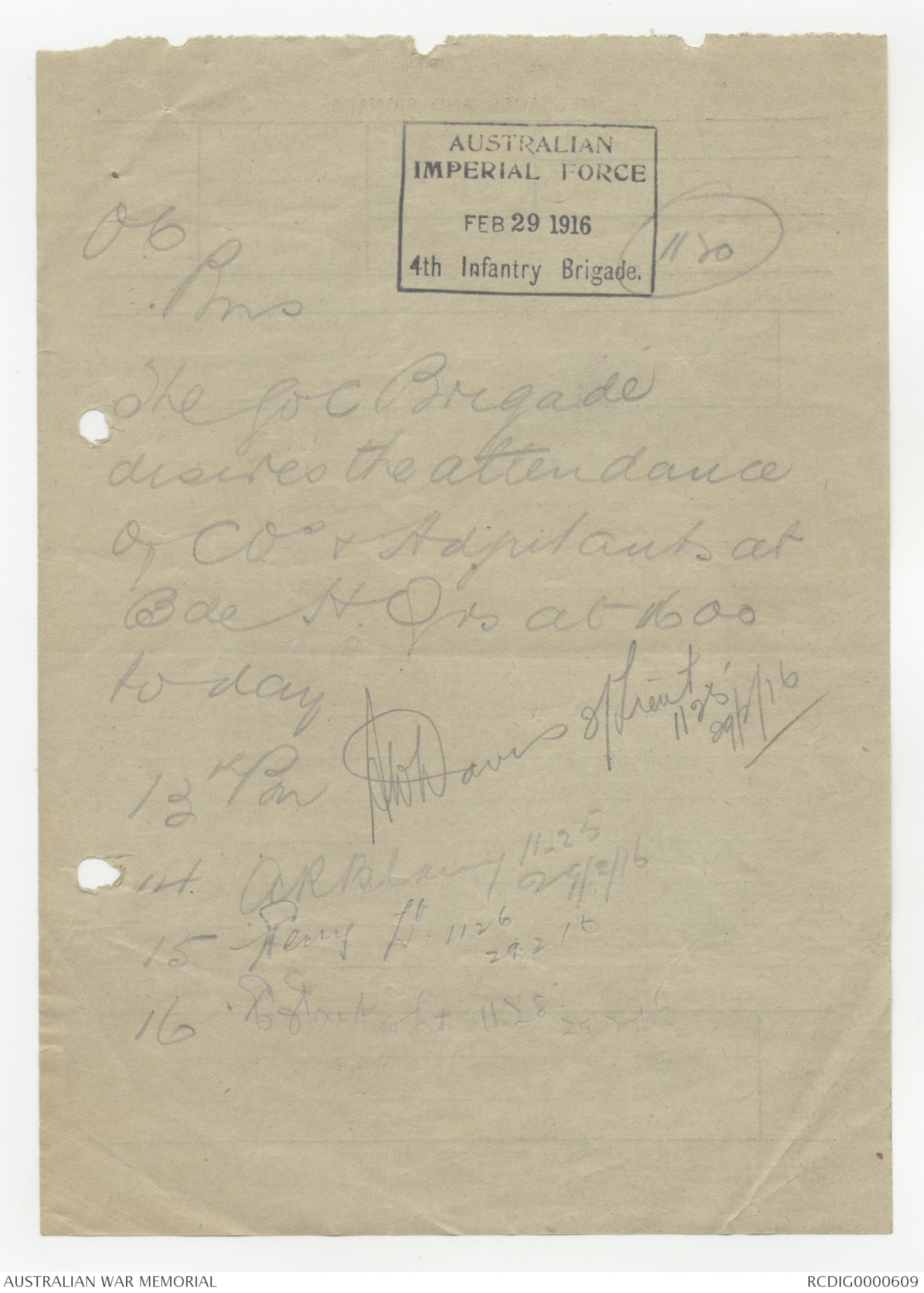
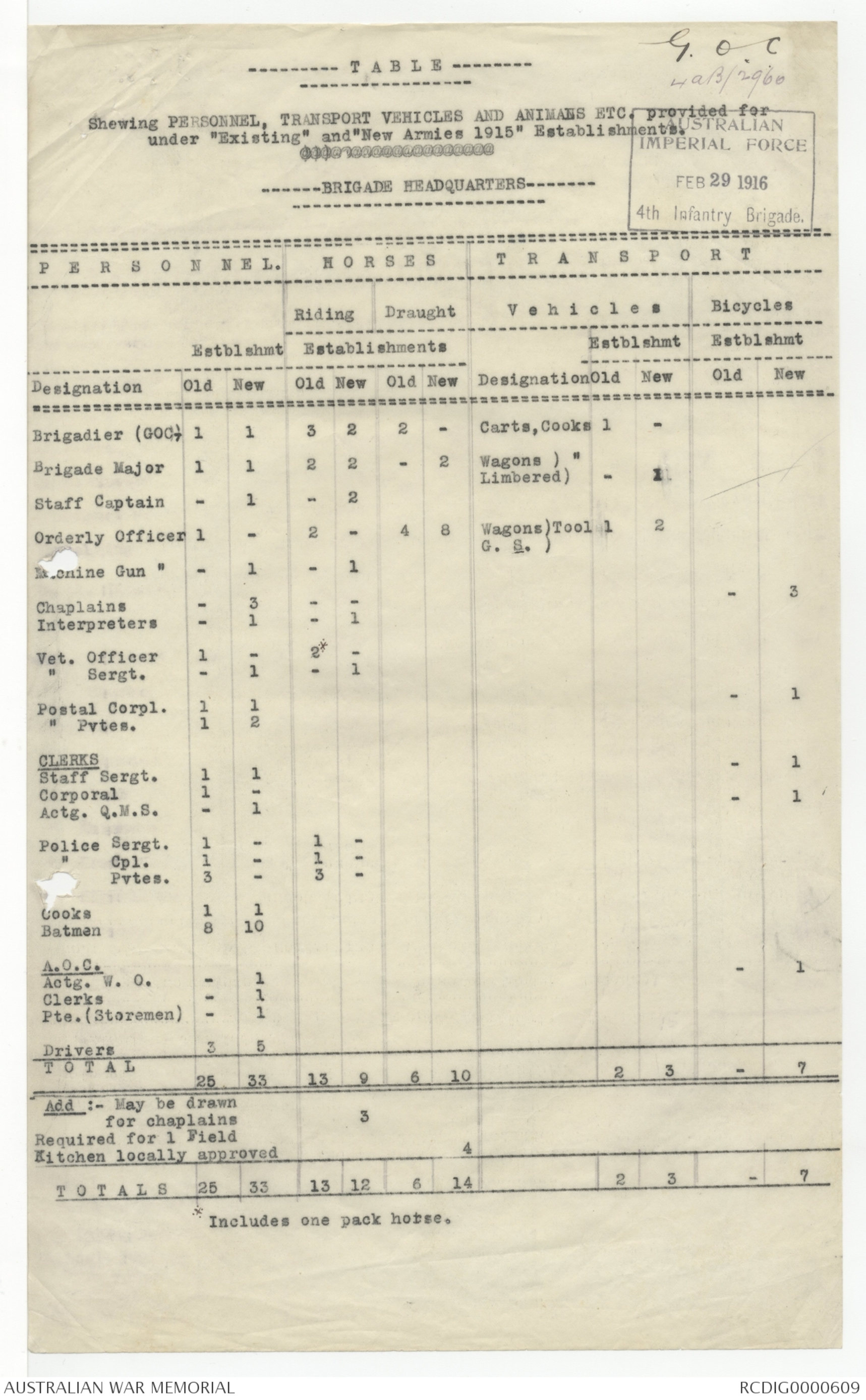
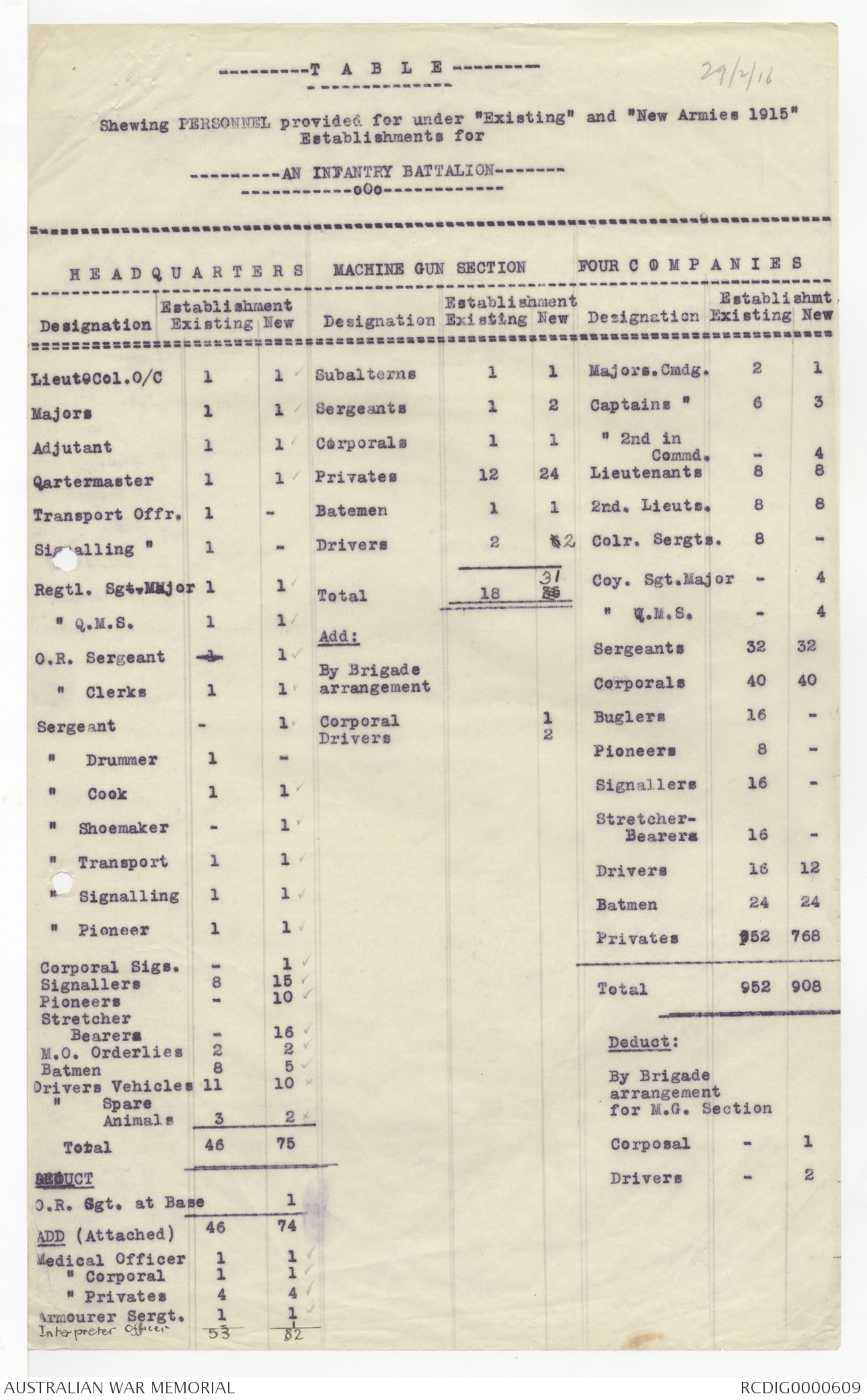
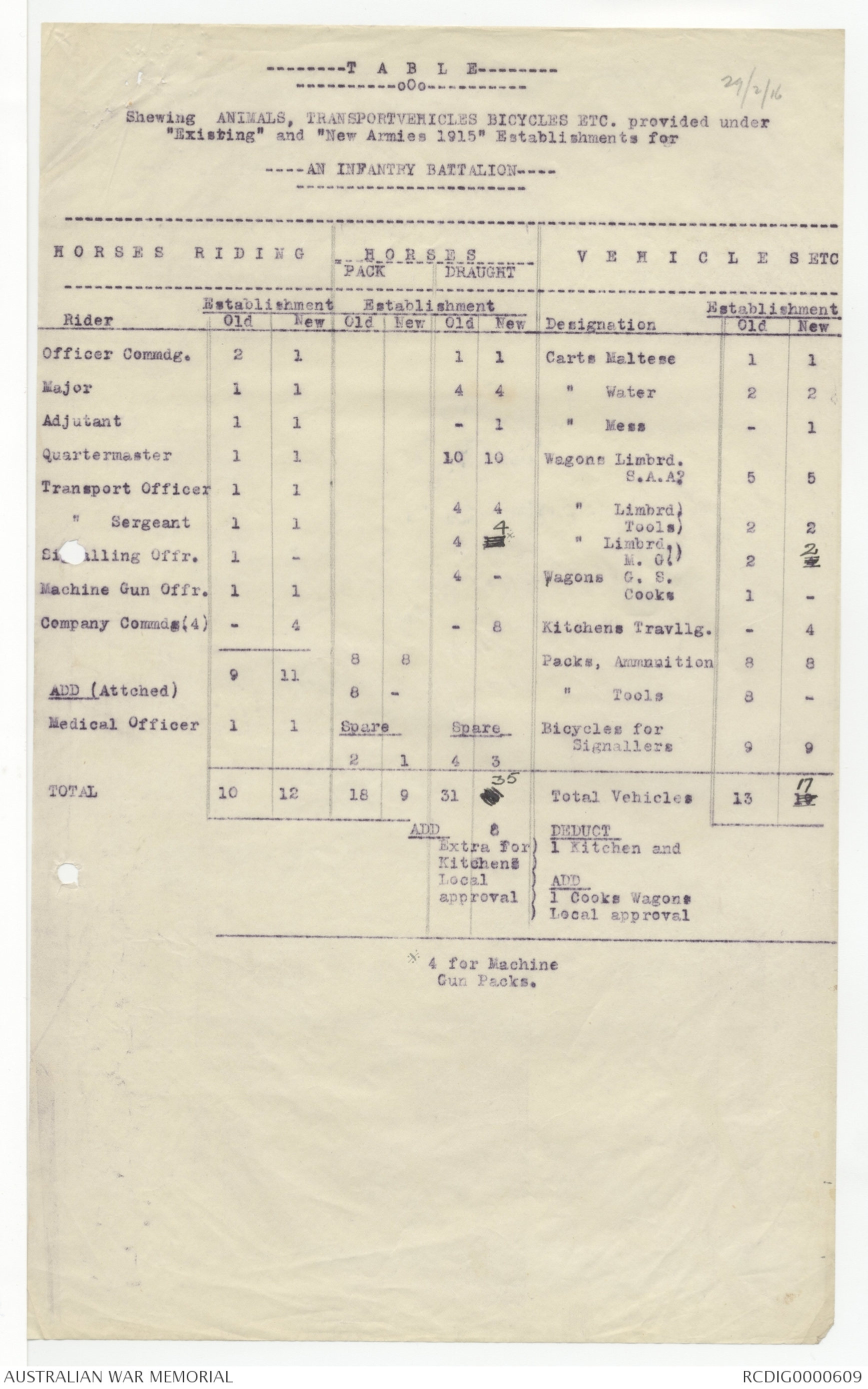
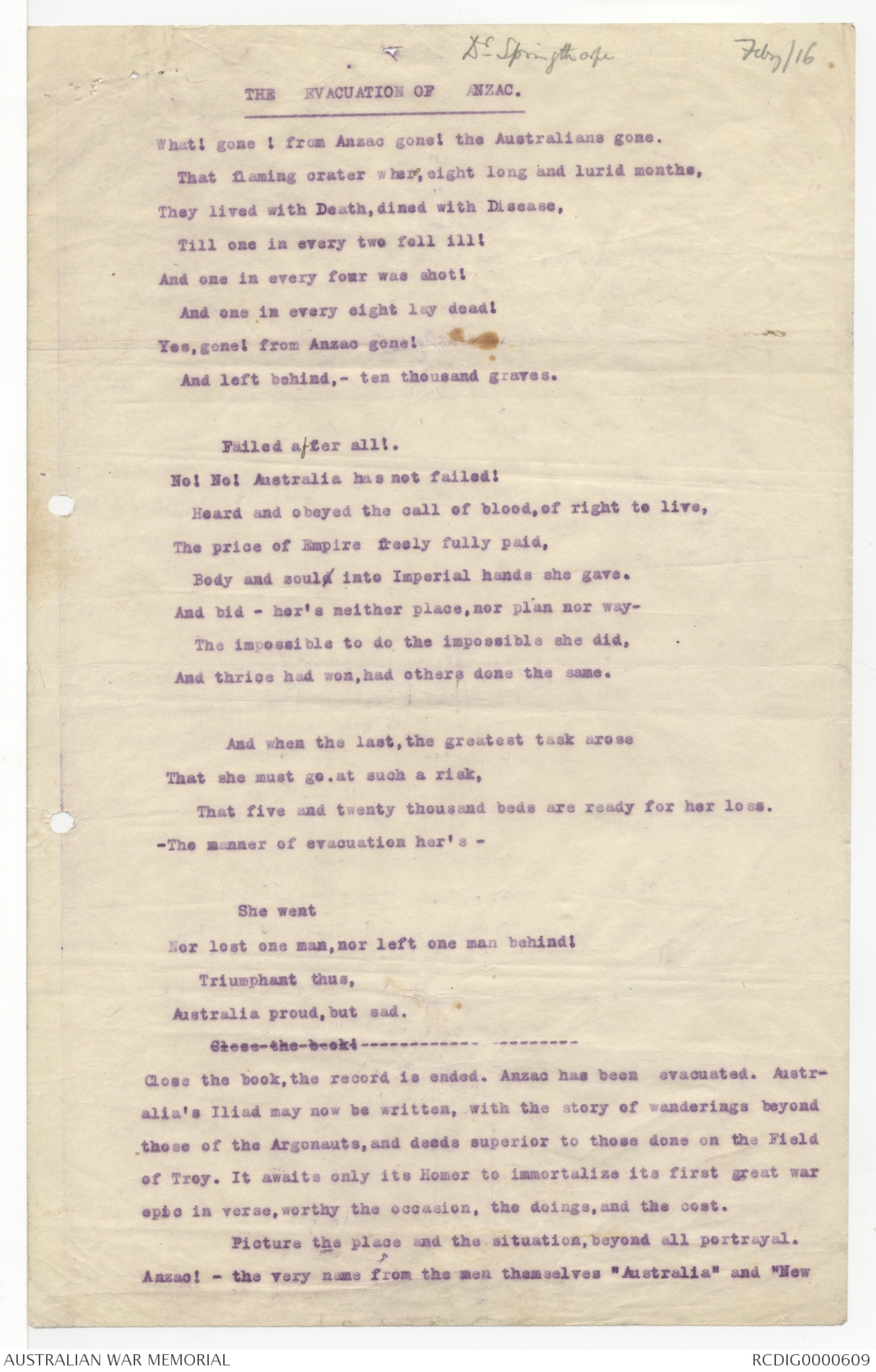
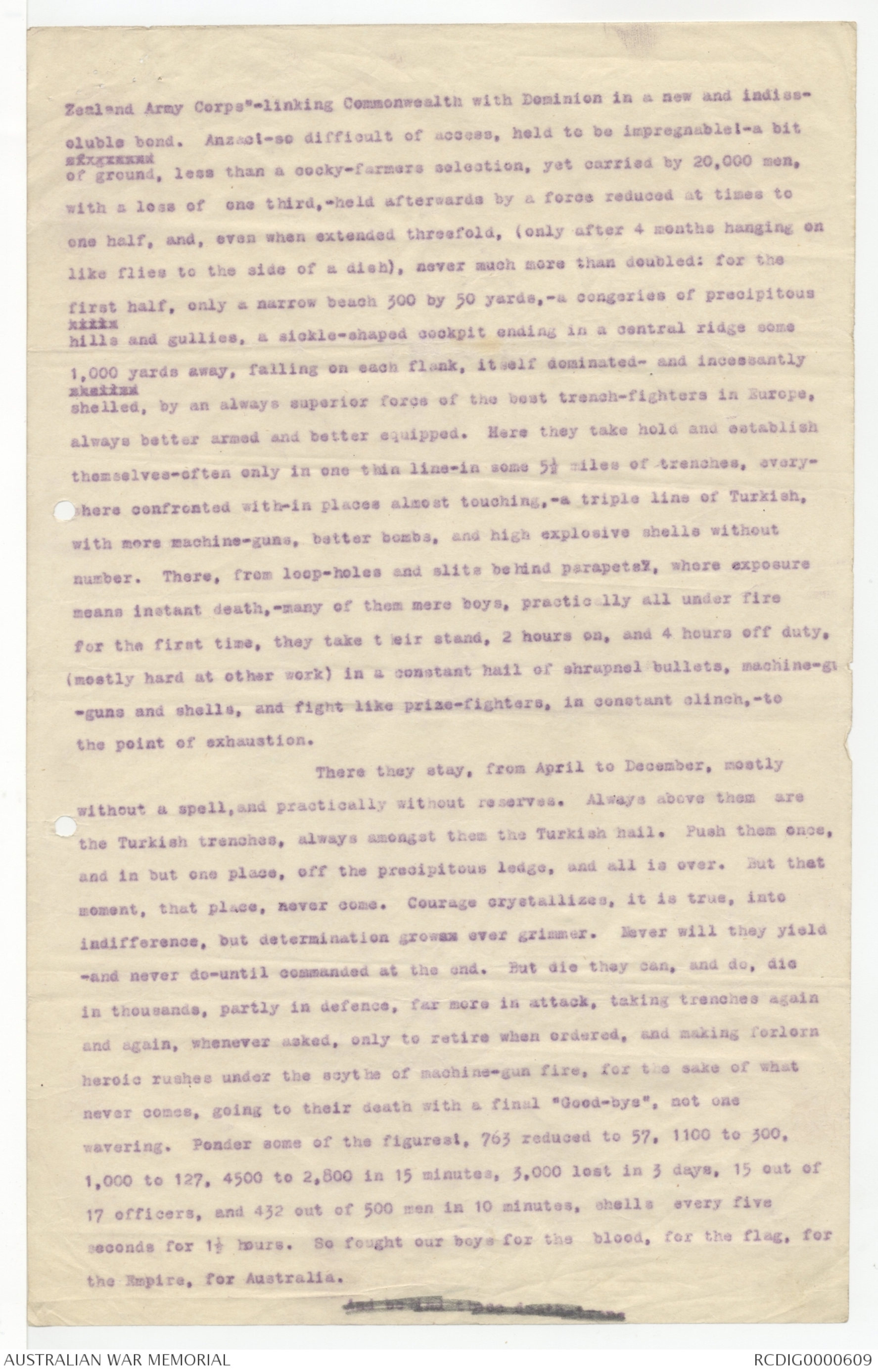
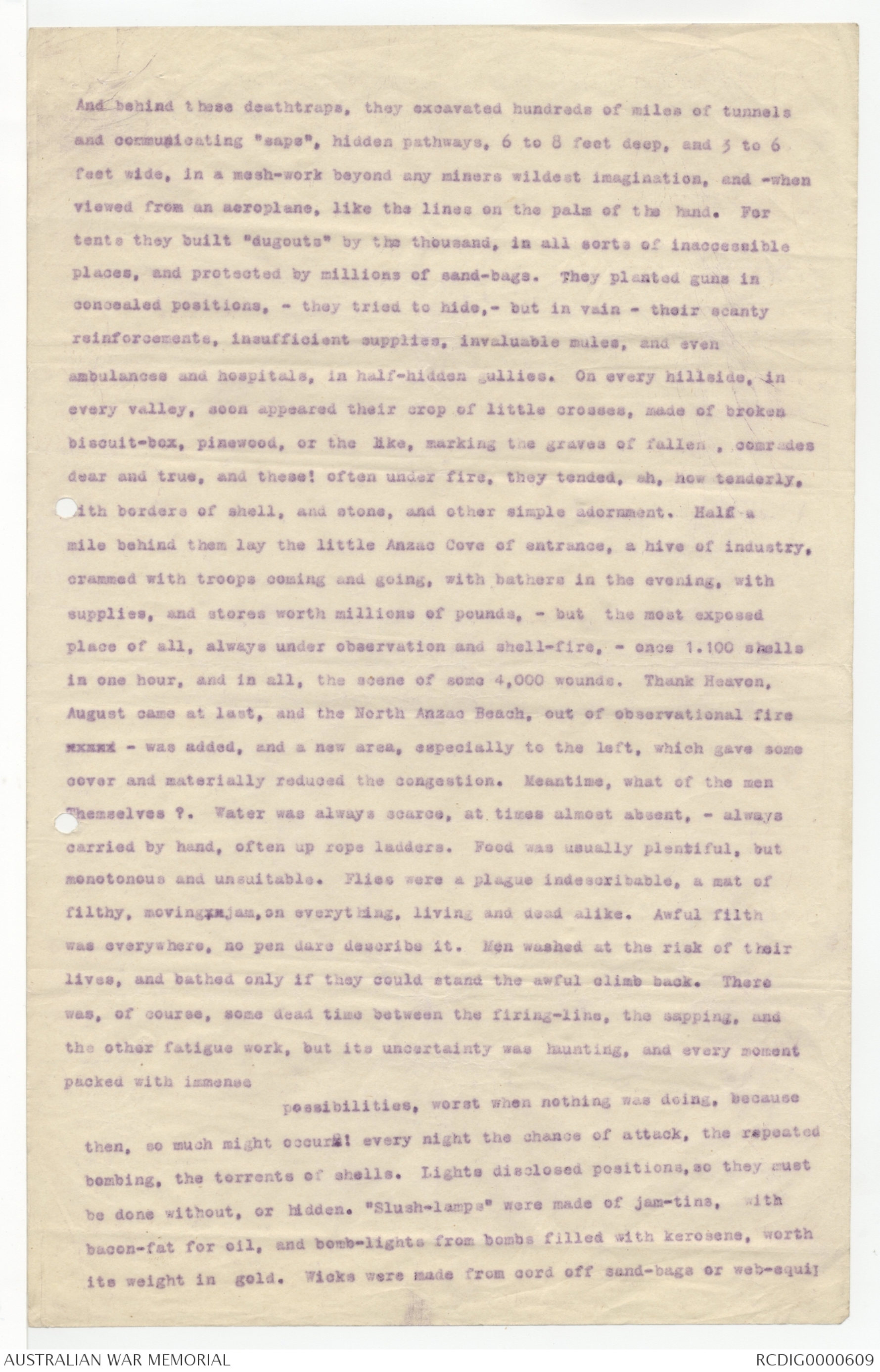
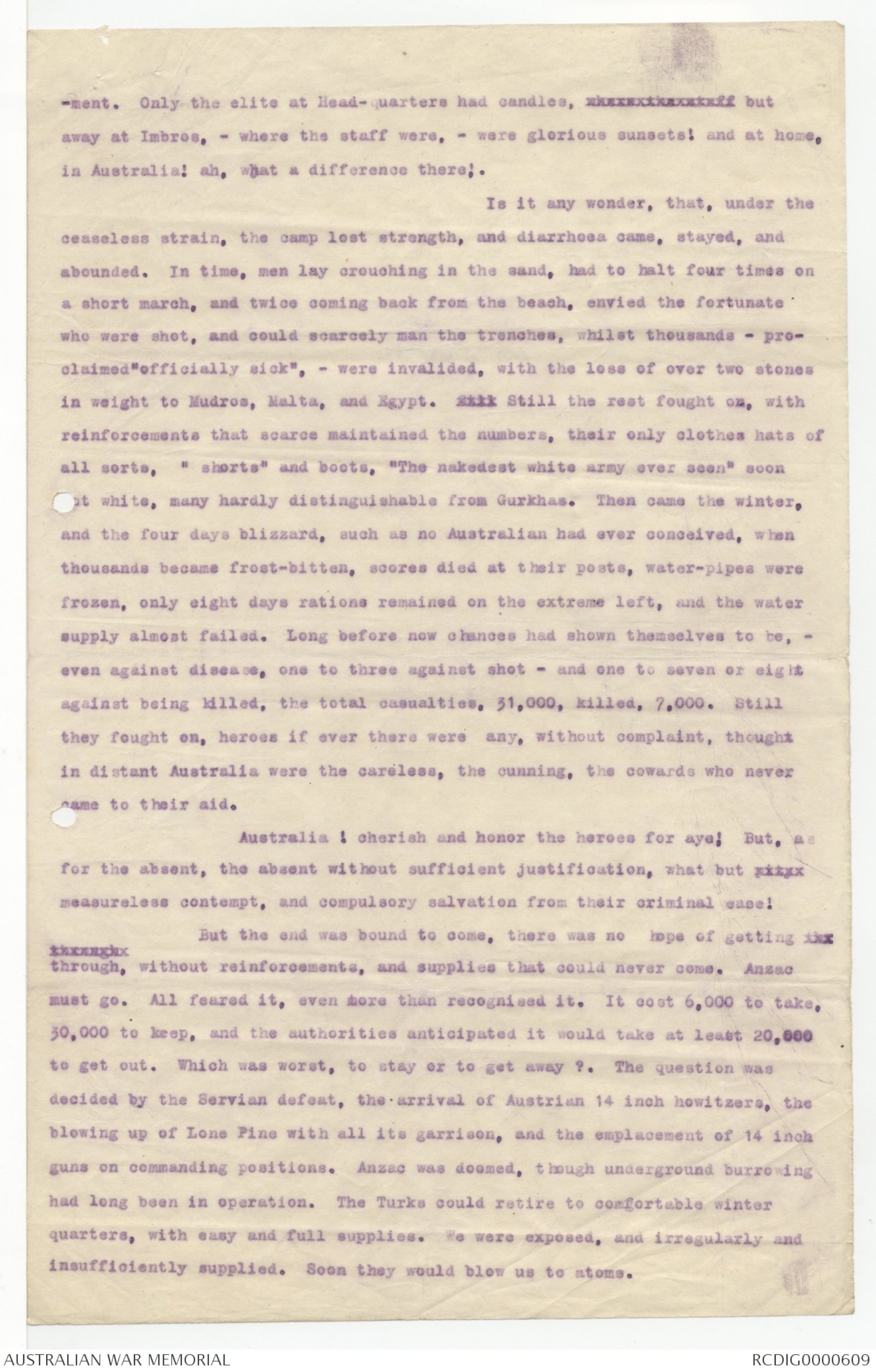
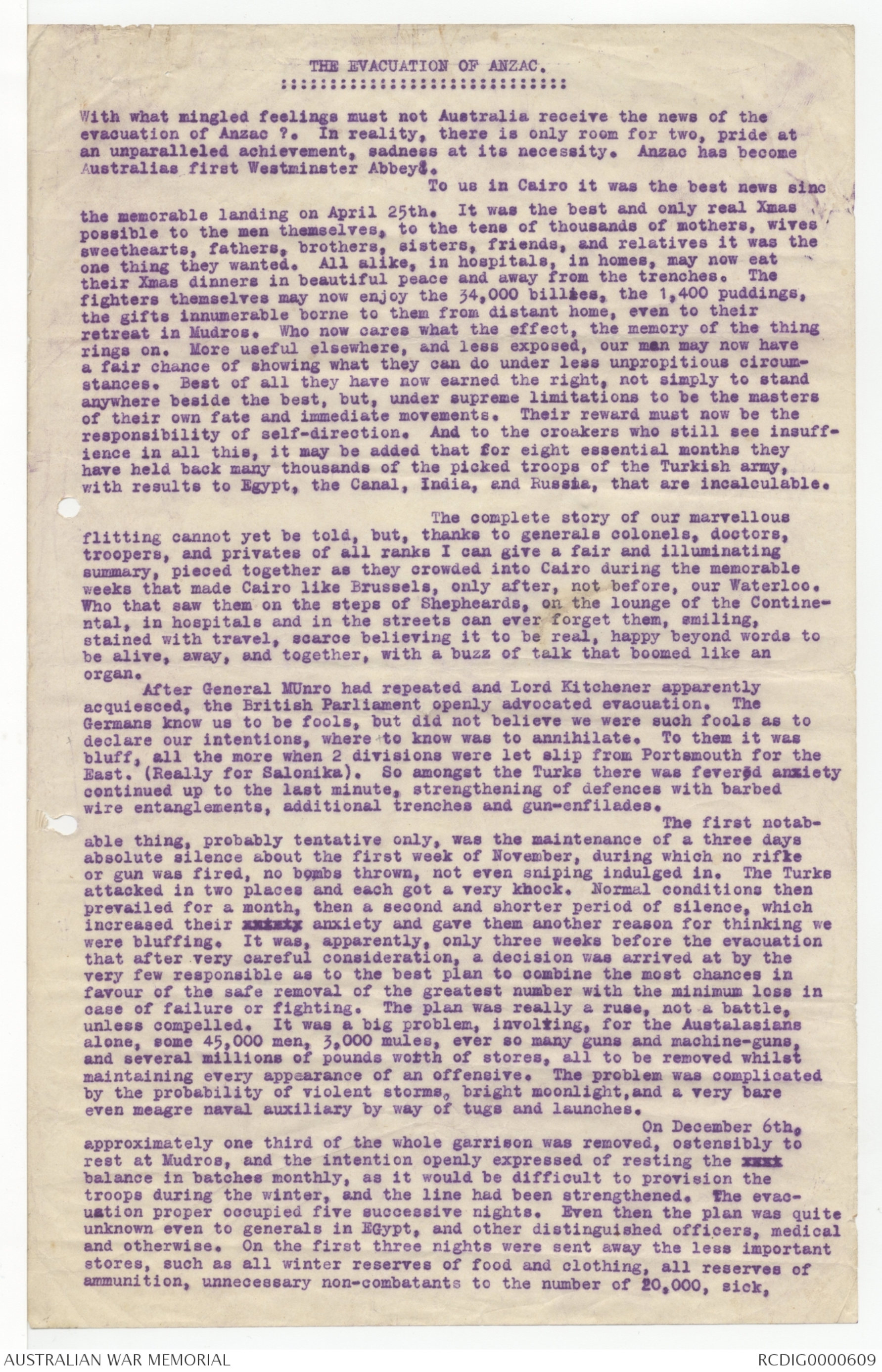
B.M.
Please arrange a meeting of
C.O's & adjutants at
1600 today.
[*Action taken JPM Bm 29*]
Orderly officer to arrange for
table & seating accommodation.
↓ JM
L Simonson
JP McGlinn Lt Col
Bns 29 29/02/16
8
AUSTRALIAN
IMPERIAL FORCE
FEB 29 1916
4th Infantry Brigade. 11 20
OC Bns
The GOC Brigade
desires the attendance
of COs & Adjutants at
Bde H.Qrs at 1600
today
13th Bn AW Davis 2/Lieut 11.25 29/2/16
14 AR [[Blamey?]] 11.25 29/2/16
15 [[Perry?]] Lt 1126 29.2.16
16 [[?]] Lt 1128 29.2.16
TABLE G.O.C
4aB/2960
AUSTRALIAN IMPERIAL FORCE
FEB 29 1916
4th Infantry Brigade.
Shewing PERSONNEL, TRANSPORT VEHICLES AND ANIMALS ETC. provided for
under "Existing" and "New Armies 1915" Establishments.
BRIGADE HEADQUARTERS
|
PERSONNEL. |
||
| Estblshmnt | ||
| Designation | Old | New |
| Brigadier (GOC) | 1 | 1 |
| Brigade Major | 1 | 1 |
| Staff Captain | - | 1 |
| Orderly Officer | 1 | - |
| Machine Gun " | - | 1 |
| Chaplains | - | 3 |
| Interpreters | - | 1 |
| Vet. Officer | 1 | - |
| " Sergt. | - | 1 |
| Postal Corpl. | 1 | 1 |
| " Pvtes. | 1 | 2 |
| CLERKS | ||
| Staff Sergt. | 1 | 1 |
| Corporal | 1 | - |
| Actg. Q.M.S. | - | 1 |
| Police Sergt. | 1 | - |
| " Cpl. | 1 | - |
| " Pvtes. | 3 | - |
| Cooks | 1 | 1 |
| Batmen | 8 | 10 |
| A.O.C. | ||
| Actg. W. O. | - | 1 |
| Clerks | - | 1 |
| Pte. (Storemen) | - | 1 |
| Drivers | 3 | 5 |
| TOTAL | 25 | 33 |
| TOTALS | 25 | 33 |
|
H O R S E S |
||||
|
Riding |
Draught | |||
|
Establishments |
||||
| Designation | Old | New | Old | New |
| Brigadier (GOC) | 3 | 2 | 2 | - |
| Brigade Major | 2 | 2 | - | 2 |
| Staff Captain | -- | 2 | ||
| Orderly Officer | 1 | - | 4 | 8 |
| Machine Gun " | - | 1 | ||
| Chaplains | - | - | ||
| Interpreters | - | 1 | ||
| Vet. Officer | 2* | - | ||
| " Sergt. | - | 1 | ||
| Postal Corpl. | ||||
| " Pvtes. | ||||
| CLERKS | ||||
| Staff Sergt. | ||||
| Corporal | ||||
| Actg. Q.M.S. | ||||
| Police Sergt. | 1 | - | ||
| " Cpl. | 1 | - | ||
| " Pvtes. | 3 | - | ||
| Cooks | ||||
| Batmen | ||||
| A.O.C. | ||||
| Actg. W. O. | ||||
| Clerks | ||||
| Pte. (Storemen) | ||||
| Drivers | ||||
| TOTAL | 13 | 9 | 6 | 10 |
|
Add : May be drawn for Chaplains |
3 | |||
|
Required for 1 Field Kitchen locally approved |
4 | |||
| TOTALS | 13 | 12 | 6 | 14 |
*Includes one pack horse
|
TRANSPORT |
||||
|
Vehicles |
Bicycles | |||
| Estblshmt | Estblshmt | |||
| Designation | Old | New | Old | New |
| Carts, Cooks | 1 | - | ||
|
Wagons ) " Limbered ) |
- | 1 | ||
|
Wagons )Tool G. S. |
1 | 2 | ||
| Machine Gun " | ||||
| Chaplains | - | 3 | ||
| Interpreters | ||||
| Vet. Officer | ||||
| " Sergt. | ||||
| Postal Corpl. | - | 1 | ||
| " Pvtes. | ||||
| CLERKS | ||||
| Staff Sergt. | - | 1 | ||
| Corporal | ||||
| Actg. Q.M.S. | - | 1 | ||
| Police Sergt. | ||||
| " Cpl. | ||||
| " Pvtes. | ||||
| Cooks | ||||
| Batmen | ||||
| A.O.C. | ||||
| Actg. W. O. | - | 1 | ||
| Clerks | ||||
| Pte. (Storemen) | ||||
| Drivers | ||||
| TOTAL | 2 | 3 | - | 7 |
| TOTALS | 2 | 3 | - | 7 |
TABLE - 29/2/16
Shewing PERSONNEL provided for under "Existing" and "New Armies 1915
Establishments for
AN INFANTRY BATTALION
===============================================================================
| HEADQUARTERS | MACHINE GUN SECTION | FOUR COMPANIES | ||||||
| Designation |
Establishment Existing| New |
Designation |
Establishment Existing| New |
Designation |
Establishment Existing| New |
|||
| Lieut |
1 | 1 √ | Subalterns | 1 | 1 | Majors.Cmdg. | 2 | 1 |
| Majors | 1 | 1 √ | Sergeants | 1 | 2 | Captains " | 6 | 3 |
| Adjutant | 1 | 1 √ | Corporals | 1 | 1 | " 2nd in Commd. | - | 4 |
| Qartermaster | 1 | 1 √ | Privates | 12 | 24 | Lieutenants | 8 | 8 |
| Transport Offr. | 1 | - | Batemen | 1 | 1 | 2nd Lieuts. | 8 | - |
| Signalling " | 1 | - | Drivers | 2 | Colr. Sergts. | 8 | - | |
| Regtl. Sgt.Major | 1 | 1 √ | Total | 18 |
31
|
Coy.Sgt.Major | - | 4 |
| " Q.M.S | 1 | 1 √ | Add: | " Q.M.S. | - | 4 | ||
| O.R. Sergeant | 1 √ | By Brigade arrangement | Sergeants | 32 | 32 | |||
| " Clerks | 1 | 1 √ | Corporal | 1 | Corporals | 40 | 40 | |
| Sergeant | - | 1 √ | Drivers | 2 | Buglers | 16 | - | |
| " Drummer | 1 | - | Pioneers | 8 | - | |||
| " Cook | 1 | 1 √ | Signallers | 16 | - | |||
| " Shoemaker | - | 1 √ | Stretcher-Bearers | 16 | - | |||
| " Transport | 1 | 1 √ | Drivers | 16 | 12 | |||
| " Signalling | 1 | 1 √ | Batmen | 24 | 24 | |||
| " Pioneer | 1 | 1 √ | Privates | 752 | 768 | |||
| Corporal Sigs. | - | 1 √ | Total | 952 | 908 | |||
| Signallers | 8 | 15 √ |
Deduct: By Brigade arrangement for M.G. Section |
|||||
| Pioneers | - | 10 √ | Corposal | - | 1 | |||
|
Stretcher Bearers |
- | 16 √ | Drivers | - | 2 | |||
| M.O. Orderlies | 2 | 2 √ | ||||||
| Batmen | 8 | 5 √ | ||||||
| Drivers Vehicles | 11 | 10 x | ||||||
| " Spare Animals | 3 | 2 x | ||||||
| Total | 46 | 75 | ||||||
|
DEDUCT O.R. Sgt. at Base |
1 | |||||||
| ADD (Attached) | 46 | 74 | ||||||
| Medical Officer | 1 | 1 √ | ||||||
| " Corporal | 1 | 1 √ | ||||||
| " Privates | 4 | 4 √ | ||||||
| Armourer Sergt. | 1 | 1 √ | ||||||
| Interpreter Officer | 53 | 82 | ||||||
TABLE 29/2/16
Shewing ANIMALS, TRANSPORT VEHICLES BICYCLES ETC. provided under
"Existing" and "New Armies 1915" Establishments for
AN INFANTRY BATTALION
-------------------------------------------------------------------------------------------------------------------------
| HORSES RIDING |
HORSES |
VEHICLES ETC |
|||||||
| PACK |
DRAUGHT |
||||||||
|
Establishment |
Establishment |
Establishment |
|||||||
| Rider | Old | New | Old | New | Old | New | Designation | Old | New |
| Officer Commdg. | 2 | 1 | 1 | 1 | Carts Maltese | 1 | 1 | ||
| Major | 1 | 1 | 4 | 4 | " Water | 2 | 2 | ||
| Adjutant | 1 | 1 | - | 1 | " Mess | - | 1 | ||
| Quartermaster | 1 | 1 | 10 | 10 |
Wagons Limbrd. S.A.A? |
5 | 5 | ||
| Transport Officer | 1 | 1 | |||||||
| " Sergeant | 1 | 1 | 4 | 4 |
" Limbrd ) Tools ) |
2 | 2 | ||
| Signalling Offr. | 1 | - | 4 |
" Limbrd ) M. G ) |
2 |
2
|
|||
| Machine Gun Offr. | 1 | 1 | 4 | - |
Wagons G.S. Cooks |
1 | - | ||
| Company Commd |
- | 4 | - | 8 | Kitchens Travllg. | - | 4 | ||
| ----- | ----- | 8 | 8 | Packs Ammnnition | 8 | 8 | |||
| 9 | 11 | ||||||||
| ADD (Attched) | 8 | - | " Tools | 8 | - | ||||
| Medical Officer | 1 | 1 |
Spare |
Spare |
Bicycles for Signallers | 9 | 9 | ||
| 2 | 1 | 4 | 3 | ||||||
| TOTAL | 10 | 12 | 18 | 9 | 31 |
35
|
Total Vehicles | 13 |
17
|
ADD 8 DEDUCT
Extra for ) 1 Kitchen and
Kitchens )
Local ) ADD
approval ) 1 Cooks Wagons
Local approval
4 for Machine
Gun Packs.
Dr Springthorpe
Feby/16.
THE EVACUATION OF ANZAC
What! gone! I from Anzac gone! the Australians gone.
That flaming crater where, eight long and lurid months,
they lived with Death, dined with Disease,
Till one in every two fell ill!
And one in every four was shot!
And one in every eight lay dead!
Yes, gone! from Anzac gone!
And left behind, - ten thousand graves.
Failed after all!
No! No! Australia has not failed!
Heard and obeyed the call of blood, of right to live,
The price of Empire freely fully paid
Body and sould into Imperial hands she gave.
And bid - her's neither place, nor plan nor way-
The impossible to do the impossible she did,
And thrice had won, had others done the same
And when the last, the greatest task arose
That she must go. at such a risk,
That five and twenty thousand beds are ready for her loss
-The manner of evacuation her's -
She went
Nor lost one man, nor left one man behind!
Triumphant thus,
Australia proud, but sad.Close the book! ------------------- -------------
Close the book, the record is ended. Anzac has been evacuated. Australia's
Iliad may now be written, with the story of wanderings beyond
those of the Argonauts, and deeds superior to those done of the Field
of Troy. It awaits only its Homer to immortalize its first great war
epic in verse, worthy the occasion, the doings, and the cost.
Picture the place and the situation, beyond all portrayal.
Anzac! - the very name from the men themselves "Australia" and "New
Zealand Army Corps"-linking Commonwealth with Dominion in a new and
Indissoluble bond. Anzac!-so difficult of access, held to be impregnable !-a bitof ground
of ground, less than a cocky-farmers selection, yet carried by 20,000 men,
with a loss of one third,-held afterwards by a force reduced at times to
one half, and, even when extended threefold, (only after 4 months hanging on
like flies to the side of a dish), never much more than doubled: for the
first half, only a narrow beach 300 by 500 yards,-a congeries of precipitoushills
hills and gullies, a sickle-shaped cockpit ending in a central ridge some
1,000 yards away, falling on each flank, itself dominated- and incessantlyshelled
shelled, by an always superior force of the best trench-fighters in Europe,
always better armed and better equipped. Here they take hold and establish
themselves-often only in one thin line-in some 5½ miles of trenches, every-
where confronted with-in places almost touching, -a triple line of Turkish,
with more machine-guns, better bombs, and high explosive shells without
number. There, from loop-holes and slits behind parapetsX, where exposure
means instant death, -many of them mere boys, practically all under fire
for the first time, they take their stand, 2 hours on, and 4 hours off duty,
(mostly hard at other work) in a constant hail of shrapnel bullets, machine-
-guns and shells, and fight like prize-fighters, in constant clinch, -to
the point of exhaustion.
There they stay, from April to December, mostly
without a spell, and practically without reserves. Always above them
the Turkish trenches, always amongst them the Turkish hail. Push them once,
and in but one place, off the precipitous, it is true, late
moment, that place, never come. Courage crystallizes, it is true, into
indifference, but determination grown ever grimmer. Never will they yield
-and never do-until commanded at the end. But die they can, do, die
in thousands, partly in defence, far more in attack, taking trenches again
and again, whenever asked, only to retire when ordered, and making forlorn
heroic rushes under the scythe of machine-gun fire, for the sake of what
never comes, going to their death with a final "Good-bye", not one
wavering. Ponder some of the figures!, 763 reduced to 57, 1100 to 300,
1,000 to 127, 4500 to 2,800 in 15 minutes, 3,00 lost in 3 days, 15 out of
17 officers, and 432 out of 500 men in 10 minutes, shells every five
seconds for 1½ hours. So fought our boys for the blood, for the flag, for
the Empire, for Australia.
And behind these deathtraps, they excavated hundreds of miles of tunnels
and communicating "saps", hidden pathways, 6 to 8 feet deep, and 3 to 6
feet wide, in mesh-work beyond any miners wildest imagination, and -when
viewed from an aeroplane, like the lines on the palm of the hand. For
tents they built "dugouts" by the thousand, in all sorts of inaccessible
places, and protected by millions of sand-bags. They planted guns in
concealed positions, - they tried to hide, - but in vain - their scanty
reinforcements, insufficient supplies, invaluable mules, and even
ambulances and hospitals, in half-hidden gullies. On every hillside, in
every valley, soon appeared their crop of little crosses, made of broken
biscuit-box, pinewood, or the like, marking the graves of the fallen, comrades
dear and true, and these! often under fire, they tended, ah, how tenderly.
with borders of shell, and stone, and other simple adornment. Half a
mile behind them lay the little Anzac Cove of entrance, a hive of industry,
crammed with troops coming and going, with bathers in the evening, with
supplies, and stores worth millions of pounds, - but the most exposed
place of all, always under observation and shell-fire, - once 1.100 shells
in one hour, and in all, the scene of some 4,00 wounds. Thank Heaven,
August came at last, and the North Anzac Beach, out of observational fire
xxxxx - was added, and a new area, especially to the left, which gave some
cover and materially reduced the congestion. Meantime, what of the men
Themselves?. Water was always scarce, at times almost absent, - always
carried by hand, often up rope ladders. Food was usually plentiful, but
monotonous and unsuitable. Flies were a plague indescribable, a mat of
filthy, movingxxjam, on everything, living and dead alike. Awful filth
was everywhere, no pen dare describe it. Men washed at the risk of their
lives, and bathed only if they could stand the awful climb back. There
was, of course, some dead time between the firing-line, the sapping, and
the other fatigue work, but its uncertainty was haunting, and every moment
packed with immense
possibilities, worst when nothing was doing, because
then, so much might occur! every night the chance of attack, the repeated
bombing, the torrents of shells. Lights disclosed positions, so they must
be done without, or hidden. "Slush-lamps" were made of jam-tins. With
bacon-fat for oil, and bomb-lights from bombs filled with kerosene, worth
its weight in gold. Wicks were made from cord off
sand-bags or web-equipment.
sent. Only the elite at Head-quarters had candles xxxxxxxxxxxxxxx but
away at Imbres, - where the staff were, - were glorious sunsets! and at home,
in Australia! ah, what a difference there!.
Is it any wonder, that, under the
ceaseless strain, the camp lost strength, and diarrhoea came, stayed, and
abounded. In time, men lay crouching in the sand, had to halt four times on
a short march, and twice coming back from the beach, envied the fortunate
who were shot, and could scarcely man the trenches, whilst thousands - proclaimed "officially sick", - were invalided, with the loss of over two stones
in weight to Mudros, Malta, and Egypt. xxxx Still the rest fought on, with
reinforcements that scarce maintained the numbers, their only clothes hats of
all sorts, "shorts" and boots. "The nakedest white army ever seen" soon
not white, many hardly distinguishable from Gurkhas. Then came the winter,
and the four days blizzard, such as no Australian had ever conceived, when
thousands became frost-bitten, scores died at their posts, water-pipes were
frozen, only eight days rations remained on the extreme left, and the water
supply almost failed. Long before now chances had shown themselves to be, -
even against disease, one to three against shot - and one to seven or eight
against being killed, the total casualties, 31,000, killed, 7,000. Still
they fought on, heroes if ever there were any, without complaint, thoughx
in distant Australia were the careless, the cunning, the cowards who never
came to their aid.
Australia! cherish and honor the heroes for aye! But, as
for the absent, the absent without sufficient justification, what but xxxxx
measureless contempt, and compulsory salvation from their criminal case!
But the end was bound to come, there was no hope of getting xxx
xxxxxxx through, without reinforcements, and supplies that could never come. Anzac
must go. All feared it, even more than recognised it. It cost 6,000 to take,
30,000 to keep, and the authorities anticipated it would take at least 20,000
to get out. Which was worst, to stay or to get away?. The question was
decided by the Servian defeat, the arrival of Austrian 14 inch howitzers, the
blowing up of Lone Pine with all its garrison, and the emplacement of 14 inch
guns on commanding positions. Anzac was doomed, though underground burrowing
had long been in operation. The Turks could retire to comfortable winter
quarters, with easy and full supplies. We were exposed, and irregularly and
insufficiently supplied. Soon they would blow us to atoms.
THE EVACUATION OF ANZAC.
With what mingled feeling must not Australia receive the news of the
evacuation of Anzac?. In reality, there is only room for two, pride at
an unparalleled achievement, sadness at its necessity. Anzac has become
Australias first Westminster AbbeyX.
To us in Cairo it was the best news sinc
the memorable landing memorable landing on April 25th. It was the best and only real Xmas
possible to the men themselves, to the tens of mothers, wives
sweethearts, fathers, brothers, sisters, friends, and relatives it was the
one thing they wanted. All alike, in hospital, in homes, may now eat
their Xmas dinners in beautiful peace and away from the trenches. The
fighters themselves may now enjoy the 34,000 billies, the 1,400 puddings,
the gifts innumerable borne to them from distant home, even to their
retreat in Mudros. Who now cares what the effect, the memory of the thing
rings on. More useful elsewhere, and less exposed, our man may now have
a fair chance of showing what they can do under less unpropitious circumstances
Best of all they have now earned the right, not simply to stand
anywhere beside the best, but, under supreme limitations to be the masters
of their own fate and immediate movements. Their reward must now be the
responsibility of self-direction. And to the croakers who still see insuffience
in all this, it may be added that for eight essential months they,
have held back many thousands of the picked troops of the Turkish army,
with results to Egypt, the Canal, India, and Russia, that are incalculable.
The complete story of our marvellous
flitting cannot yet be told, but, thanks to generals colonels, doctors
troopers, and privates of all ranks I can give a fair and illuminating
summary, pieced together as they crowded into Cairo during memorable
weeks that made Cairo like Brussels, only after, not before, our Waterloo.
Who that saw them on the steps of Shepheards, on the lounge of the Continental,
in hospitals and in the streets can ever forget them, smiling,
stained with travel, scarce believing it to be real, happy beyond words to
be alive, away, and together, with a buzz to talk that boomed like an
organ.
After General MUnro had repeated and Lord Kitchener apparently
acquiesced, the British Parliament openly advocated evacuation. The
Germans know us to be fools, but did not believe we were such fools as to
declare our intentions, where to know was annihilate. To them it was
bluff, all the more when 2 divisions were let slip from Portsmouth for the
East. (Really for Salonika). So amongst the Turks there was fevered anxiety
continued up to the last minute, strengthening of defences with barbed
wire entanglements, additional trenches and gun-enfilades.
The first notable
thing, probably tentative only, was the maintenance of a three days
absolute silence about the first week of November, During which no rifle
or gun was fired, no bombs thrown, not even sniping indulged in. The Turks
attacked in two places and each go a very [[knock?]]. Normal conditions then
prevailed for a month, then a second and shorter period of silence, which
increased their xxxxxx anxiety and gave them another reason for thinking we
were bluffing. It was, apparently, only three weeks before the evacuation
that after very careful consideration, a decision was arrived at by the
very few responsible as to the best plan to combine the most chances in
favour of the safe removal of the greatest number with the minimum loss in
case of failure or fighting. The plan was really a ruse, not a battle,
unless compelled. It was a big problem, involving, for the Australians
alone, some 45,000 men, 3,000 mules, ever so many guns and machine-guns,
and several millions of pounds worth of stores, all to be removed whilst
maintaining every appearance of an offensive. The problem was complicated
by the probability of violent storms, bright moonlight, and a very bare
even meagre naval auxiliary by way of tugs and launches.
On December 6th,
approximately one third of the whole garrison was removed, ostensibly to
rest at Mudros, and the intention openly expressed of resting the xxxx
balance in batches monthly, as it would be difficult to provision the
troops during the winter, and the line had been strengthened. The evacuation
proper occupied five successive nights. Even then the plan was quite
unknown even to generals in Egypt, and other distinguished officers, medical
and otherwise. On the first three nights were sent away the less important
stores, such as all winter reserves of food and clothing, all reserves of
ammunition, unnecessary non-combatants to the number of 20,000, sick,
This transcription item is now locked to you for editing. To release the lock either Save your changes or Cancel.
This lock will be automatically released after 60 minutes of inactivity.